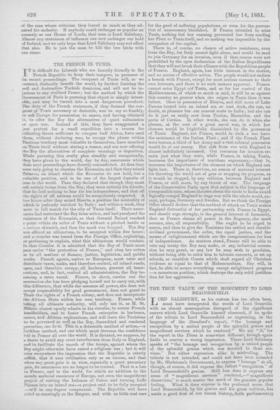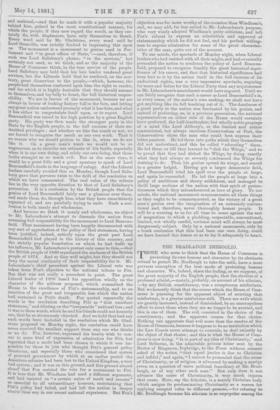THE TRUE VALUE OF THE MONUMENT TO LORD BEACONSFIELD.
ORD SALISBURY, as his custom has too often been, 4 must have interpreted the words of Lord Granville with an almost unscrupulous disregard of the significant reserve which Lord Granville himself observed, if ho spoke of the tribute to Lord Beaconsfield as expressing, in the language of the Standard's report, " the homage and recognition by a united people of the splendid genius and magnificent services which ho rendered." We say " if," for the report in the Times is somewhat different, though again liable to convey a wrong impression. There Lord Salisbury speaks of " the homage and recognition by a united people of the splendid genius which was devoted to their ser- vices." But either expression alike is misleading. The tribute is not intended, and could not have been intended by Mr. Gladstone's Government, to express " homage " at all, though, of course, it did express the fullest "recognition of Lord Beaconsfield's genius. Still less does it express any sense of "magnificent services" rendered,—" magnificent disservices," is much nearer the mark of the genuine popular
feeling. What it does express is the profound sense that Lord Beaconsfield, by his genius and his great volition, has made a good deal of our recent history,, bath parliamentary
and national,—and that he made it with a popular majority behind him, gained in the most constitutional manner, for which the people, if they now regard the result, as they cer- tainly do, with displeasure, have only themselves to thank. Every word said by Mr. Gladstone, every word said by Lord Granville, was strictly limited to impressing this upon us. The monument is a monument to genius used in Par- liament and " in great offices of State,"—used, therefore, if such was Lord Salisbury's phrase, " in the services," but certainly not used, as we think, and as the majority of the House of Commons think, in the true service of the people. Lord Salisbury may hold that his late leader rendered great services, but the Liberals hold that he rendered, on the con- trary, great disservices to the people,—which, however, the people had themselves conferred upon him the right to render, and for which it is highly desirable that they should assume to themselves, and lay fully to heart, the full historical respon- sibility. We are in favour of the monument, because we are always in favour of looking history full in the face, and letting any great nation understand precisely what it has done, and what it has either to congratulate itself upon, or to regret. Lord Beaconsfield was raised to his high position by a great English party. His party was then made the strongest party in the State by the English people, in the full exercise of their un- doubted privileges ; and whether we like the result or not, we are forced to recognise the result as our own work. That is no reason why we should profess to like it, when we do not like it. On a great. man's tomb we would not be so ungenerous as to inscribe our estimate of his faults, especially when it is our own doing, and solely our own doing, that those faults wrought us so much evil. But at the same time, it would be a great folly and a great apostacy to speak of Lord Beaconsfield's deeds in the language of eulogy. And the Liberal leaders carefully avoided this on Monday, though Lord Salis- bury gave that perverse twist to the drift of the resolution on which we have commented. The real value of the tribute lies in the very opposite direction to that of Lord Salisbury's peroration. It is a confession by the British people that the genius of Lord Beaconsfield fairly cast a glamour over them, and made them do, through him, what they have since bitterly repented of, and are painfully trying to undo. Such a con- fession is both manly and wholesome. And because we think it manly and wholesome, we object to Mr. Labouchere's attempt to dissuade the nation from assuming full responsibility for the monument to Lord Beacons- field. That monument having been happily disconnected with any sort of approbation of the policy of that statesman, having been justified, indeed, entirely upon the great part Lord Beaconsfield had played in the history of this country, and the strictly popular foundation on which he had built up his influence, Mr. Labouchere's protest only came to this,—that the British people of 1880 repudiated the madness of the British people of 1874. And so they well might, but they should not deny the moral continuity of their responsibility for it. Mr. Labouchere's chief precedent against the Liberal vote was taken from Fox's objection to the national tribute to Pitt. But that was not really a precedent in point. The great Liberal leader of 1806 based his opposition wholly on the character of the address proposed, which committed the House to the excellence of Pitt's statesmanship, and to an assertion of the great and irreparable loss which the nation had sustained in Pitt's death. Fox quoted repeatedly the words in the resolution describing Pitt as " that excellent statesman," and dilating on the " irreparable" national loss ; and it was to these words, which he and his friends could not honestly use, that ho so strenuously objected. And we hold that had any such words been included in the resolution which Mr. Glad- stone proposed on Monday night, the resolution could have never received the smallest support from any one who thinks as we do. Fox, hbwever, expressed his hearty wish to con- cur in some kind of expression of admiration for Pitt, but regretted that a mode had been chosen in which it was im- possible for those to join who thought Pitt's general policy disastrous, and especially those who considered that system of personal government by which at an earlier period the American colonies had been lost to the United Kingdom, a very bad system ; and it was on this ground, and this ground almost alone'," that Fox resisted the vote for a monument to Pitt. It is true that Mr. Windham had used a different argument, and had insisted on " a certain union of merit and success " as essential to all extraordinary honours, maintaining that Pitt's policy had failed, and had loft the nation in deeper straits than any in our recent national experience. But Fox's objection was far more worthy of the occasion than Windham's, and, we may add, far less suited to Mr. Labouchere's purpose, who very wisely adopted Windham's petty criticism, and left Fox's refusal to express an admiration and approval of statesmanship which he did not feel, and his perfect willing- ness to express admiration for some of the great character- istics of the man, quite out of the account.
To'our minds, the spectacle of Monday night, when Liberal loaders who had resisted with all their might, and had eventually persuaded the nation to condemn the policy of Lord Beacons- field, proposed to recognise frankly the great historical signi- ficance of his career, and that that historical significance had been lent to it by the nation itself in the full exercise of its undoubted rights, was a very impressive spectacle, auguring far more and better for the Liberal Party than any acquiescence in Mr. Lhbouchere's amendment would have augured. Until we can fairly recognise that such a career as Lord Beaconsfield's is, in every sense, of the nation's own making, we shall not have got anything like its full teaching out of it. The dumbness of a great party in the nation was fascinated by his genius, and instead of preferring, as, in a previous generation, the national representatives on either side of the House would certainly have preferred, the half-inarticulate, but wholly noble gropings of a mind like Lord Althorp's, or the limited and rather conventional, but always cautious. Conservatism of Peel, the Conservatives chose the man who could best express their bitter passions. He led them into paths which they themselves did not understand, and this he called " educating " them.
He led them on till they learned to "dish the Whigs," and to be proud that they had dished the Whigs, by doing exactly what they had always so severely condemned the Whigs for desiring to do. Then his genius spread its wings, and soared to a greater height. Having got a larger democratic field, Lord Beaconsfield tried his spell over the people at large, and again he succeeded. He led the people at large into a policy of ambitious and showy selfishness, and managed to thrill large sections of the nation with that spirit of preten- tiousness which they misunderstood as love of glory. To our minds, the national monument commemorates all these things as they ought to be commemorated, as the victory of a great man's genius over the imagination of an extremely conven- tional and, therefore, never thoroughly honest people. It will be a warning to us for all time to come against the sort of magnetism to which a plodding, respectable, conventional, limited, not wholly candid, national mind will always be most dangerously subject. Only by a national monument, only by a frank confession that this had been our own doing, could we have learned this lesson so as to lay it adequately to heart.







































 Previous page
Previous page